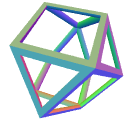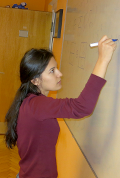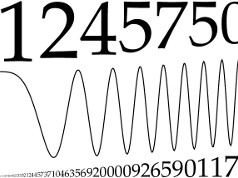
 |
|
|
|
|
|
 |
|
|
 |
 |
 |
 |
|
|
|
General InformationStudents of Mathematics may either take Engineering and Science Mathematics courses (``regular variant'' of the curriculum) or ANALYSIS and LINEAR ALGEBRA (``advanced variant'' of the curriculum) during their first year of study. Following the advanced variant is recommended; students should consult with Mathematics faculty for advice. Learning goals
CoursesTake at least one course per semester from among the following.
| ||||||||||||||||||||||||||||||||||||||||||||||||||||||||||||||||||||||||||||||||||||||||||||||||||||||||||||||||||||||||||||||||||
| Semester: | 1-2 | |
|---|---|---|
| Credit Points: | 15 |
This module is taken by all students who follow the regular track of the Mathematics and ACM Bachelor degrees. Students with a strong background in Mathematics should take ANALYSIS and LINEAR ALGEBRA in their first year.
| Semester: | 3-4 (regular variant) or 1-2 (advanced variant) | |
|---|---|---|
| Credit Points: | 15 |
This module provides the foundations in Mathematical Analysis for students of Mathematics and ACM. In addition, it may be an appropriate first year or second year choice for students particularly in Physics, Electrical Engineering and Computer Science. Consult with faculty from your major, and read the document ``How to choose Mathematics courses''.
The courses in this module have no formal prerequisites; incoming students with a strong mathematics background are encouraged to take this module in their first year of study (``Advanced Track'' of the Mathematics curriculum). However, a familiarity with mathematical reasoning and proof (e.g. proof by induction or by contradiction) is assumed. The module GENERAL MATHEMATICS AND COMPUTATIONAL SCIENCE is designed for students who still need to develop this maturity.
| Semester: | 3-4 (regular variant) or 1-2 (advanced variant) | |
|---|---|---|
| Credit Points: | 15 |
This module complements ANALYSIS in the fundamental education of the Mathematics major. Students of ACM should consider taking this module. It may also be an appropriate first year or second year choice for students particularly in Physics, Electrical Engineering and Computer Science. Consult with faculty from your major, and read the document ``How to choose Mathematics courses''.
The courses in this module have no formal prerequisites; incoming students with a strong mathematics background are encouraged to take this module in their first year of study (``Advanced Track'' of the Mathematics curriculum). However, a familiarity with mathematical reasoning and proof (e.g. proof by induction or by contradiction), is assumed. The module GENERAL MATHEMATICS AND COMPUTATIONAL SCIENCE is designed for students who still need to develop this maturity.
| Semester: | 3-4 (regular variant) or 1-2 (advanced variant) | |
|---|---|---|
| Credit Points: | 5-10 |
While the mathematical core courses build the foundation for a solid mathematical knowledge, the courses in this module cover beautiful or interesting areas of mathematics which need not be part of a systematic education, but which show mathematics as a lively, active and varied subject, and which convey the spirit why mathematicians enjoy their field. The topics covered in each instance of a course vary, so that each course may be taken for credit more than once.
| Semester: | 5-6 (regular variant) or 3-6 (advanced variant) | |
|---|---|---|
| Credit Points: | varying |
Third year courses in Mathematics are designed to give students a first in-depth look into a wide selection of specialization areas in Mathematics. They also refine and extend the fundamental concepts introduced in ANALYSIS and LINEAR ALGEBRA. The courses are designed to be as independent as possible, so that a flexible selection of courses is possible. Some spring semester courses will depend to a limited extent on fall semester courses, and students should consult the individual course descriptions for details.
| Semester: | 5-6 | |
|---|---|---|
| Credit Points: | 15 |
In this module, students work on a research project in a particular area of specialization within mathematics. A faculty member acts as a supervisor and works with the student in a small study group or on a one-on-one basis.
Guided research has three major components: Literature study, research project, and seminar presentation (including a written report). The Guided Research report in the spring semester will typically be the Bachelor's Thesis which is a graduation requirement for Jacobs University undergraduates.
Last updated
2014-08-07, 18:04.
© Jacobs University Bremen.
All rights reserved.
Data Privacy Statement/Datenschutzerklärung